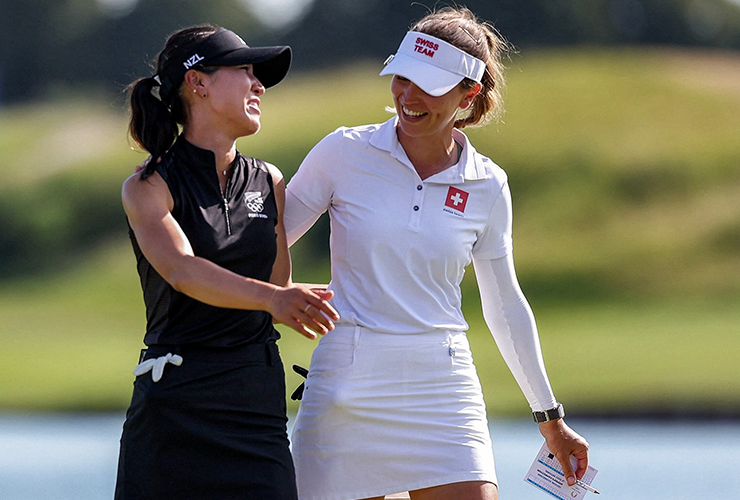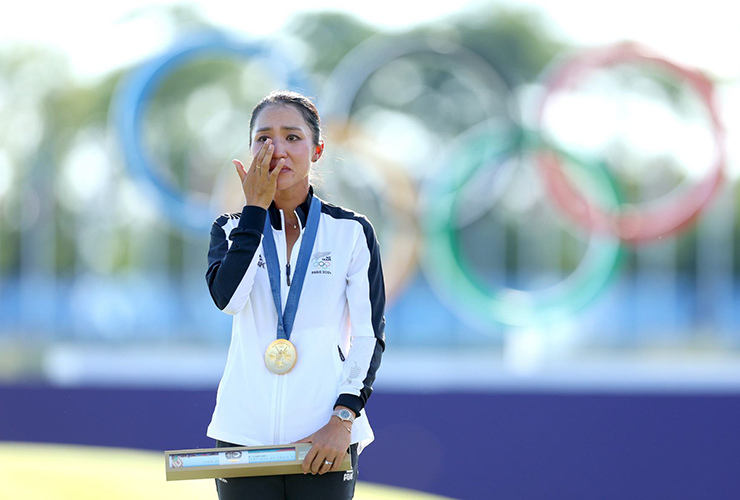Lydia Ko merely hinted at her retirement after winning the gold medal at Le Golf National on Saturday. She doesn’t know how much longer she will play this game that has placed her on and atop the biggest stages for more than half of her 27 years on the planet. But with that gold medal around her neck that completes a personal medal trifecta for Olympic golf, she seemed certain that this will be her last Olympics. And you believe her.
But you don’t want to.
Because as gritty and as graceful as the newest member of the LPGA Hall of Fame plays this game, as much as you might miss her syrupy technique and her efficient strategic style of play in a game that seems intent on rewarding only the boldest and the brashest, what you come away with missing the most is the way this person travels. Like her tactical play down the 72nd hole, Ko seemingly glides through a life that probably seems as charmed as any. And yet you know deep down it always hasn’t been. Only someone as grounded as Ko can teach us that we are at our best when every moment isn’t only about us. That’s heady stuff when someone who knows she is the centre of attention is quick to reach out for someone else.
Ko, who clearly achieved a lifetime dream with her performance—a closing one-under par 71 for a 10-under total to win by two and qualify her as the youngest member of the LPGA hall— is the kind of player—no, person—who worries more about signing golf balls for scorers and standard bearers than signing the most important scorecard of her life. She’s the kind of player— no person—who’s cheering a playing partner’s putt for eagle when she herself is about to clinch the title that should be her sole focus. She’s the kind of player—no, person—who’s seen enough to know that being consumed with the result is missing the point. She knows how big this day was, and she’s not afraid to admit that it really isn’t all that big in the grand scheme of things. Ko may still be in her 20s, but she sounds like Mother Earth.
“I struggled a little bit in middle of this year, and I felt like I had lost a little bit of direction, and it helped me realise that, ‘Hey, it potentially might not happen,’” said Ko, who bested silver medalist Esther Henseleit (66) of Germany by two and Chinese bronze medalist Xiyu Lin (69) by three.
“There were two key people that said, ‘You know what, if it doesn’t happen, it’s OK. You’ve had an unbelievable career and just because you’re in the Hall of Fame, that doesn’t make you any different.”
Ko took solace and wisdom from her husband, Jun Chung, and mother, who introduced her to the game and has guided her through ups, downs, coaches, advisors, caddies, always finding a truth that only she can know. She has had to overcome controversies with teachers and others who wanted to take her game and career in different directions, and now finds herself in the kind of place that only is stable because of experience.
“They told me whether you’re in the Hall of Fame or not, we’re still proud of you, and the things you have accomplished has been so much more than like I could have ever asked for,” Ko said. “So I think they made me realize that, ‘Hey, even if it doesn’t happen, like that’s just my fate. I’m going to do my absolute best to keep putting myself in contention and in good position going into the final days, but whether it happens or not, like I think there’s a golf god somewhere that controls it.”

Lydia Ko celebrates winning the gold medal with Switzerland’s Morgane Metraux – PIERRE-PHILIPPE MARCOU
There is this confident letting-go that Ko exhibits in the way she talks now that almost sounds like a kind of poetry. She knows for a time that she was the best player in the game, and yet she has the wisdom that comes from years in which she didn’t win at all. She was the No. 1 player in the world just two years ago, but failed to even make the season-ending CME Group Tour Championship the following year. Now, she’s back on the top of the mountain and yet she knows sometimes the view is what matters, not planting the flag.
“For it to have happened here at the Olympics is just unreal,” she said. “I do feel like I’m a mythical character in a story tale. It really couldn’t have gotten any better than I could have imagined, and I’ve had so many grateful things that happened in my career so far, and this really tops it. I couldn’t have asked for anything more to be honest.”
Ko’s final round here at the Olympics displayed the consistency that her game has come to be known for. She hit 10 fairways, 14 greens and made four birdies. And then in the same way, like in her life both inside and outside the ropes, she found herself blindsided by circumstance. A well-struck shot on the 13th hole surprisingly found the water, and within an instant a lead that had been almost insurmountable was down to a shot in the final few diabolical holes that have wrecked almost every other round this week.
Not this time, not for Ko. She was calm, and she was motivated to take control of the moment by not letting it get bigger than the next step.

Gold medalist Lydia Ko reacts on the podium – Andrew Redington
“I just said to myself that I’m going to keep focusing and focusing until the ball drops on the 18th hole because I’ve had so many interesting things that have happened in my career that I wanted to focus until the very end, and then just say, okay, now it’s done,” Ko said.
As with all the greats, when they get to a moment that defines a career, there were tears, and Ko’s came during the New Zealand national anthem, as they so often do at the Olympics. You sense that Ko knew that what was ahead of her—whatever retirement might mean and whenever it might come—was more important than what was behind her. She had run the race, and run it the way she wanted to.
For all intents and purposes, it might have looked like Ko’s final phrase was a closing birdie on the 72nd hole that secured the gold. But that would have been about her. Ko instead ended her Olympics by talking about others.
“I’ve had an unbelievable experience competing in my last three Olympics,” she said. “I think [the Olympics are] going to become a goal and dream for many junior golfers growing up. I hope that they are inspired, and kids in China and Germany and all of these other countries with players that are here representing this week and last week are going to be inspired to be here or playing in L.A. [site of the 2028 Olympics] or Brisbane [2032 Olympics] in the future. I think that’s a big key. All of us are here as athletes and trying to do our best, but at the same time we want to inspire the future generations, and I think this week has been exactly that.”
Inspired by the words of Simone Biles, Ko spent this week telling herself and others that “I get to write my own ending.” Saturday, outside of Paris, Ko found all the right words at all the right moments. It would be a shame if we all couldn’t get to listen just a little longer.
Main Image: Pierre-Philippe MARCOU / AFP









